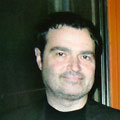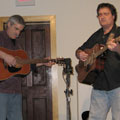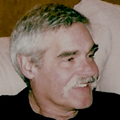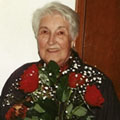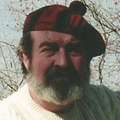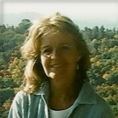Del McCoury
By Zane Campbell
October 1995
Del McCoury is undoubtedly one of the greatest bluegrass singers ever. It’s not hard to see why he won Best Male Vocalist for the last three years at the International Bluegrass Music Awards. But more important, to quote a recent New York Times rave review, “he’s the best country singer you’ve never heard of.” Why? Because people don’t go looking for their favorite “country” singer in bluegrass, but in Del’s case, they should.
People who really know and love country music and know its history often righteously bemoan the fact that today there is no one who can hold a candle to the greats but… if you wanna find the true heir to Hank Williams and George Jones, pick up any one of Del McCourys’ records and you’ll get as close to the greats as you can get. Better yet, he’s one of them. Forget about all those “new country” guys (hats) in Nashville singing their bonehead odes to Hank. What is “new country” anyway? They all finally caught up to what the Eagles and Linda Ronstadt were doing in the seventies and they’re calling it “new”? Don’t get me started. And all that retro country just sounds well… retro (i.e., FAKE).
Del McCoury is the real deal, boys, and his singing owes as much to George and Hank as it does to Bill Monroe and bluegrass. At fifty-six Del is at the top of his form and his voice is a fine-tuned, honey-cured instrument capable of amazing subtlety and expression. He makes incredible things seem easy and I think, for him, they are. He just seems to be having too much fun in it to be otherwise.
His singing is an eclectic combination of all that is best in bluegrass as well as country singing. Real North Carolina Blue Ridge Mountain roots come out in every note. Del has traveled that rough-and-rocky bluegrass road for decades, often an uphill climb as steep as the mountains where he was born. He remembers the days when bluegrass and country bands shared the same stage in outdoor music parks, long before the festivals, when the two styles of music didn’t seem so far apart. When you think about it, they’re not, both having grown from the same roots of oldtime, traditional music, before they called it “country” and before the grass was blue.
Del McCourys’ influences come from an earlier era, when people still passed down songs through families and friends—what musicologists refer to as the oral tradition. Records changed all that—everybody learned the same version then (the recorded version). But when Del was coming up, there was still some of that rich old tradition alive and you can hear that old sound in his voice, weathered by a lot of hard work and trouble. His voice conjures up a lost America of lonely highways, when the farthest north a country or bluegrass musician came was Pennsylvania. Del’s one of a dying breed and his voice, to me, is something like a national treasure.
And his band? It don’t get no better. In 1994 they won the I.B.M.A. Entertainer of the Year Award. Usually I’d say awards don’t mean much, but in bluegrass, if you’ve ever tried to play it, you know that if you don’t have perfect rhythm and if you can’t play precise, clean solos, you get left in the dust pretty quick. Your average rock ‘n’ roller trying to play it gets eaten alive. And to even be nominated in the best instrument categories you’ve got to really kick ass. Ronnie McCoury, Del’s 28-year-old son, is a genius on the mandolin. He won Best Mandolin Player at the I.B.M.A. awards three years running, and Dels’ other son, Rob, 24, was nominated for Best Banjo player for the last three years. This prompted me to ask Del if he thought talent was genetic, but we’ll get to that later.
The first time I heard of Del McCoury was in 1972 when Rounder released his High on a Mountain album. I liked him before I even heard it because my aunt, Ola Belle Campbell Reed, wrote the title song. He not only recorded her song and named the album after it, but also on it, he recorded a song my Uncle Hub wrote. (Herbert Campbell, Ola’s brother) “Don’t You Call My Name.” That record redefined “family album” for me.
So, naturally, I always wanted to meet the guy who recorded it. Exactly 20 years later Del released Live in Japan. A CD that included not only “High on a Mountain” and “Don’t You Call My Name” but also Ola Belle’s “I’ve Endured.” The first thing I said to Del McCoury when I finally got to talk to him, 23 years later, was “I believe you know my aunt Ola Belle?”
“Honest!” he said, but it wasn’t like a question. He went on, “I know Ola Belle and “Ellic” (Alex Campbell, her brother) and Herb. Yeah, man, I didn’t know that! My wife was a Campbell, but they were from Mitchell County (North Carolina).” Ola Belle, Alex and Herbert Campbell were from Ashe County, North Carolina.
I next asked Del if he had any memories of Ola Belle he’d like to share. “Ola Belle, she’s a great songwriter and I remember when she was a great performer. One time, I’ll tell you what, I was at Sunset Park. At that time her and “Ellie” (Alex) were still there at the park every Sunday like a what you call a home band. I think I had recorded one of her songs before this already, and I was sitting down I remember, and she came up with her guitar and sang me… a new song she had just written, I don’t remember the name of it. I think it was a gospel number, and man she had me in tears and very few people do that you know. Before she got done, it really touched me. I don’t remember if I asked her if I could record it, or I might of thought Ola Belle’s the only lady that could sing this song anyway, you know. I probably wouldn’t have touched it anyway but, boy, she touched me with that song.”
“Did you listen to Alex and Ola Belle on the radio growing up around there?”
“I sure did, they were in Wheeling a lot (WWVA Wheeling W. Virginia), and I used to hear them on there. But I had a younger brother that played in their band (Alex Campbell and Ola Belle & The New River Boys). Yeah. Jerry, I think… This might have been after I went to Nashville to play with Bill (Monroe) and Jerry played bass with them. Sonny Miller was not yet playing fiddle with them.”
Del was born in North Carolina but came north at the age of two with his parents. Many Southern families were migrating North at this time looking for work. They settled in York, Pennsylvania. My next question was “Del, my mother and father came from North Carolina, I always felt sort of like a displaced Southerner because I grew up in Maryland. Did you ever have that feeling that you were kinda out of place a little bit in the North?”
“Yeah, yeah, I did kinda because I had so many kinfolk there (NC), but yet I grew up and went to school there in PA you know and it kinda… you don’t know where you belong, do you? And then plus another thing when I was going to school, like in my high school years, Elvis Presley got big and Jerry Lee Lewis with the rock ‘n’ roll at that time. I was a teenager. Well, normal teenagers would like Elvis Presley you know, but I had done heard Earl Scruggs. And another thing, the music didn’t fit, you know (he laughs) with all the other kids in school. You just feel like kind of a misfit didn’t you?”
“Yeah, my mother and father hated the Beatles, but they thought Hank Williams was like… rock ‘n’ roll. They liked the country music before that.”
“I know!” Del says laughing.
When I asked him who his biggest musical influence was he said, “Earl Scruggs. Because I was 11 years old when I heard him on a record. My oldest brother bought a record of Flatt & Scruggs, and I heard that banjo and it was just like somebody turned a light on upstairs, you know, but I figured later, if I had been a different age, it probably wouldn’t have affected me, you know.”
“That’s pretty young to be excited about a banjo player,” I said.
“It really was and, man… I could not quit thinking about that and I finally… I played banjo then from ‘53 to ‘63.”
I asked him if he still picked it up once in a while. “Once in a while, but I kinda got it out of my system now (he laughs).”
I asked about his songwriting and if he found it hard to write on the road. “I’ve been so busy that I haven’t been able to settle down and write. I have to be by myself and kinda sittin’ still before I get an idea, and then I have to write it down and if I get distracted I cannot finish it.”
And how has his music changed over the years if at all? “There’s been a change. I think a person’s interests change as they grow older, and I know songs that I record now I’m sure I probably wouldn’t have even listened to back 20 years ago.”
“And you’re influenced a lot by country music as well.”
“Yeah, there’s some things I like. I like Hank. I’ve recorded maybe a couple of his songs through the years, but my sons, you know, they listen to so much different music that I never get to hear. I just don’t listen to music anymore like I used to. So, Ronnie will bring me songs and I’ve recorded them if I like them. And I’m sure if it hadn’t been for the boys I’d never heard ‘em.”
“That’s good for you.” I said. “It is. It’s true, you know, and I hear good songs in all types of music. As long as music’s good, it’s good, it don’t matter what kind it is.”
I asked him if he ever listened to the blues. “Not really, no, you know back when I was playing with Monroe probably was the first that I ever heard any of the old Delta blues singers. I never heard that stuff growing up, but we started playing a lot of these folk festivals and that’s the first I heard any of them. But I don’t think I was ever really influenced by them.”
The future of bluegrass? “I do predict it to still grow you know, along with acoustic… people are slowly going back to acoustic and ‘course bluegrass has always been mainly acoustic music. And the thing about it is we have the International Bluegrass Music Association now and we’ve been organized for 10 years now and any music, I think, has to be organized in some way before it’ll make an effect. So I can see it growing so fast now. And it seems to be getting more back to traditional style. I see a lot of young bands that are just doing the traditional sound where, back in the ’60s and ’70s, man, they were going every direction, you know. Oh man, they were just going everywhere. But a lot of times now you are a brand new band of teenagers and they’re playing traditional music and I think that’s good. I know when I was that age (11) and I heard this band, Flatt & Scruggs, and thought, man, this is some kind of music because it had a lot of excitement in it. Which I hadn’t heard in anything before that. It was fast and exciting but at the same time it was smooth.”
“How do you feel about all the awards you been getting? I understand you fell asleep at the Grammys?” He laughs.
“Well, the thing about me, I never think about that I’m going to win an award for some reason. I just think, ‘Oh no, I know who’ll get this, some other band or some other singer.’ And then when I do win it, I have no idea what to say. All I can do is just thank the fans cause without the fans you can’t make a living doing this thing. So they’re the ones I thank and the people that gave me breaks through the years. Awards are really nice, but actually what I enjoy doing is creating music and I enjoy doing shows. I love to get up and sing to people and try to connect with them somehow, and if they request my songs, I’ll do them if time permits. And I never do plan a show. We get up and do two or three numbers to start the show and then a lot of times I’ll just do requests after that. And I have a band with me now that can do things that I don’t even remember. So, I don’t have to worry about the band; the only worry is if I can remember these songs that they request!”
He told me that bluegrass fans were some of the best people and that they were “fans for life.” I asked him if he had any fond memories of Sunset Park (West Grove, PA, the longest consistently running country music park in the world.)
“I do have fond memories of that. I tell you, that was probably the first… I didn’t know what it was called in those days… but that was probably the first jam sessions I ever saw or got into… was at Sunset Park.” He laughs. “Then later on the bluegrass festivals were but a big jam session all night long! But I would say that’s the first place that I ever saw a jam session, where people just get out and play. Back in those days they booked all the good bluegrass bands there and also New River Ranch” (Alex and Ola Belle’s park in Rising Sun, MD).
“Did you play there as well?”
“I did. They were kinda in competition, but I think it was friendly competition, those two places.”
Sunset Park and New River Ranch were the last stop north in the old days for both bluegrass and country musicians, including Hank Williams, Patsy Cline, and everybody who was anybody in both styles.
I asked Del if he ever gets tired of touring.
“I don’t, really. It’s kind of a routine just like an office job, or working construction, or whatever, you know, the only thing is the routine is different (laughs). I tell you, I’ve did a lot of hard work in my time, you know, like physical work, Logging for one, and I like that kinda work, but actually this is easier, there’s no two ways about it, even with all the traveling. It just don’t get too hard for me cause I like to work hard.”
Del says hard work “makes a good person out of somebody cause hard work won’t hurt anybody.”
“I know you’ve been through some hard times, and bluegrass music is not always easy and the early days must’ve been rough.”
“Oh boy, I’ll tell you, and before me, those guys had it really rough with all the old roads.”
“You must be awfully proud of your sons.”
“They amaze me. They learn so fast. I guess they had this music around them so much, where I had to kinda dig for mine. Still, they just picked up on this so fast, but kids will.”
I asked him if he thought musical ability was genetic or in your blood.
“It must be. Yeah, I’ve thought about that. Timing, the drive, and the tone in music… it seems they grabbed on to that early, or they had it in ‘em one. They know how to get tone out of an instrument and Ronnie, he knows how to sing. So I think a lot of it is genetic.”
I told him everybody in my family played music and both my grandfathers were fiddle players from North Carolina.
“The same here. They were both fiddle players. It’s funny the music in the mountains—it just went back all the way, didn’t it?”
I asked him what was the funniest thing that ever happened on stage.
“It’s funny, the reason I remember this incident, a guy just mentioned it to me last night. I played in Olive Hill, Kentucky. I played a bluegrass festival there and the stage had fluorescent lights up over the stage and a lot of times when I get done with a show, I’ll take my guitar off and kinda stick it up in the air and I hit the fluorescent lights, broke ‘em out, and they started falling all around us. The funny part about it was a guy was videoing the show. It was really funny to see the video ‘cause my son Ron saw this stuff coming down and was sidestepping it all. Just like fireworks, you know.”
Del told me another and it began, “I shouldn’t tell this, but I think I’ll tell you. I was working for Monroe on the Opry, and Hank Snow was on the Opry at the time and he had Chubby Wise as his fiddle player. So, Chubby pushed a long bow, you know, and all that time there was only mainly one mic, and so Chubby was standing beside Hank and he pushed that bow up there and he caught Hank’s toupee and just pulled it right off. He said, ‘Chubby, you’re fired.’ He fired him, man. It’s the truth.”
I asked him about the New York Times quote: “best country singer you’ve never heard of.”
“You know, actually I never figured myself country, but I guess it’s some part of country probably. I can’t see it myself; I just sing the way I sing. I know my weaknesses in my singing, and I know what I can do and what I can’t do, and I think probably other people see it as good, but I know I got a lot of faults. But I see my own faults, and I just don’t think I’m that good.”
“Do you like those sad songs?”
“I like a story in a song. I like a song that’s to the point. But at the same time, in a show you’ve got to have a variety of styles and I like happy things too, but I think that’s what makes a show. Changing the mood and the tempos and all that.”
“How’s Bill Monroe doing?”
“Bill came to the show last night (Nashville). I got him up to sing and he sang about three songs. And he’s really doing good. He’s a tough customer right there now.”
I asked about Bill’s health.
“He’s back in shape. Sometimes he’ll sign himself out of the hospital. He’ll say, ‘You ain’t doing me no good here.’ He lives for that road and that audience.”
My final question to the three-time winner of the I.B.M.A. best male vocalist was “Whose your favorite singer?”
“George Jones.”
I got to meet Del for the first time when he played the Bottom Line and at the big Rounder Records bash between shows. You couldn’t find a more down to earth, easy-going man. There was something almost regal about him, like Southern royalty, and something spiritual. He has an easy smile on stage and off.
The band that night was as tight as can be and Ronnie’s fingers ain’t just fast—he comes up with melodic unique solos. The whole outfit was one hundred and 99 proof and smooth as silk. When they all sing together it’s like some rockin’ choir. In the end you’re left with that high lonesome, blue mountain voice of Del’s, echoing through your mind. The grass is always bluer on his side of the mountain… and there’s more “country” in his bluegrass than in most of country music today.
